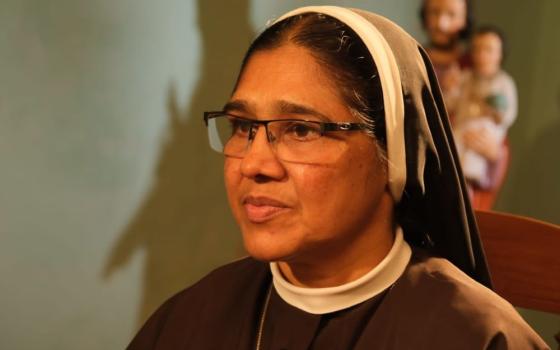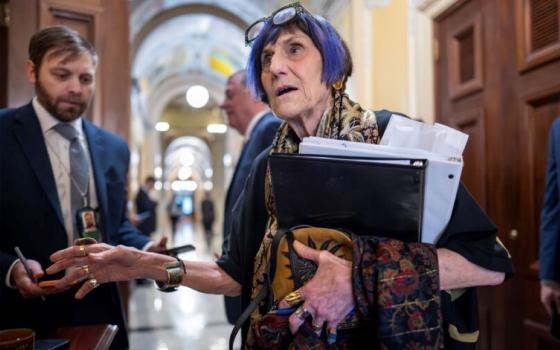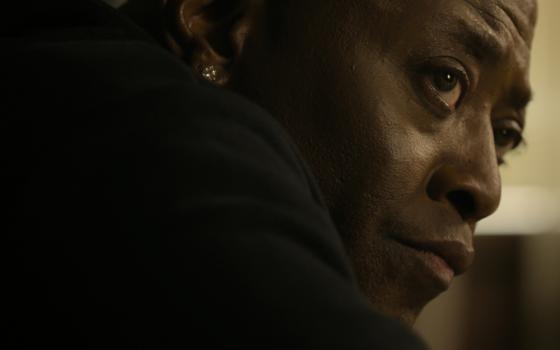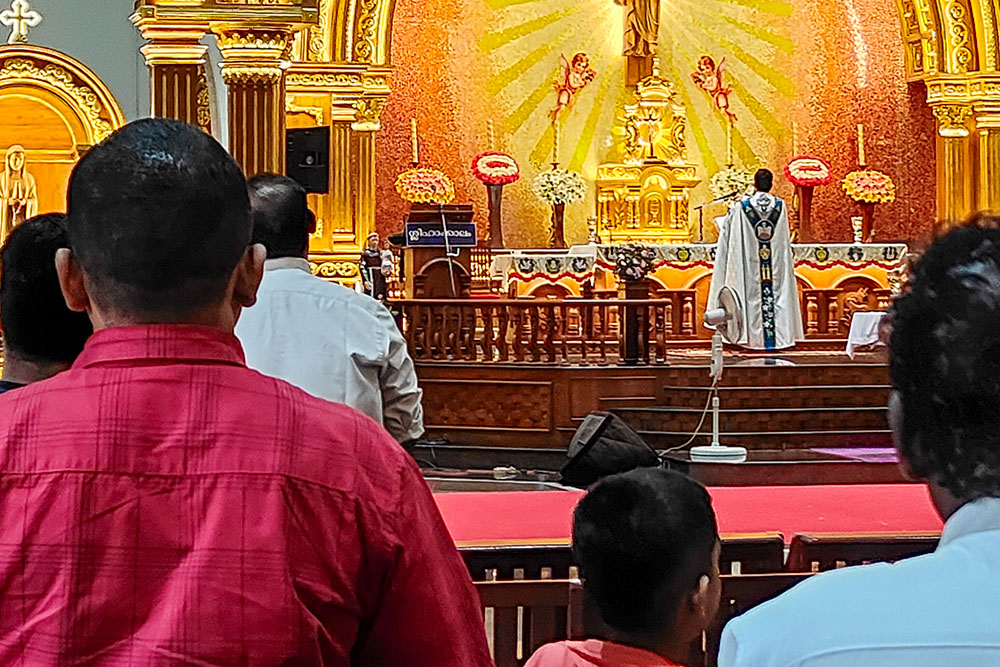
A priest celebrates Mass facing the altar in St. Mary's Church, Alangad, one of the oldest churches of the Ernakulam-Angamaly Archdiocese in the southwestern Indian state of Kerala. (Thomas Scaria)
Catholic nuns in India rejoiced after a liturgical conflict that has troubled a Syro-Malabar archdiocese for decades was resolved.
"We are really relieved, and we hope peace and happiness will remain permanently in our parish communities, homes and minds," Sr. Sherin Achanparambil said two days after the Ernakulam-Angamaly Archdiocese implemented a compromise to celebrate Mass, on the feast of St. Thomas the Apostle July 3.
The Preshitharam sister told Global Sisters Report she can now work "peacefully" in the archdiocesan headquarters in Ernakulam-Kochi, where she manages the reception desk as a member of the newly appointed administrative staff of the archbishop's residence, adjacent to the cathedral church.
The resolution of the five-decade-old liturgical dispute came on June 19 at a meeting of hundreds of priests and church officials. Under the new formula, all churches in the Ernakulam-Angamaly Archdiocese will celebrate one Mass in the "uniform method" introduced by the Syro-Malabar Synod in 1999, on Sundays and major feast days. Under the uniform method, the priest faces the altar during the eucharistic prayers and the congregation during the rest of Mass.
The resolution was approved by Major Archbishop Raphael Thattil, the head of the Oriental rite, and Archbishop Joseph Pamplany of Tellicherry, his vicar for Ernakulam-Angamaly.
Initially, Ernakulam and 12 of the church's 35 dioceses had rejected the uniform method and insisted that the priest face the congregation throughout the Mass.
Discussion on the uniform Mass was raised during the COVID-19 lockdown when churches worldwide encouraged people to attend online Mass. During this period, the practice of priests facing the congregation during Mass became popular among the faithful of other dioceses, too.
Advertisement
In August 2021, the synod mandated that all dioceses implement its official method by November to promote liturgical unity in the church. All dioceses accepted the synod's order, barring the majority of the priests and laity in Ernakulam-Angamaly.
They continued to celebrate their Mass, leading to street protests, physical fights in some churches, and the closure of the St. Mary's Cathedral Basilica. The dissidents openly defied papal orders and his representatives sent to resolve the matter.
The archdiocese, which represents 10% of the church's 5 million population, threatened to form an independent church when the synod enforced disciplinary action against the dissenting priests.
Sr. Ardra Kuzhinapurathu, the first woman president of the major superiors of Kerala, told Global Sisters Report the entire religious community in the state had been praying for a solution to the long-standing dispute in Ernakulam-Angamaly.
"We are extremely happy that a final solution was realized and our sisters can continue to work in peace," the Bethany sister told GSR on July 5.
The nun from the Syro-Malankara Church, another Oriental rite, said her association had advised the nuns serving Ernakulam-Angamal not to get directly involved in the protests, but "sit back and pray silently for a solution."
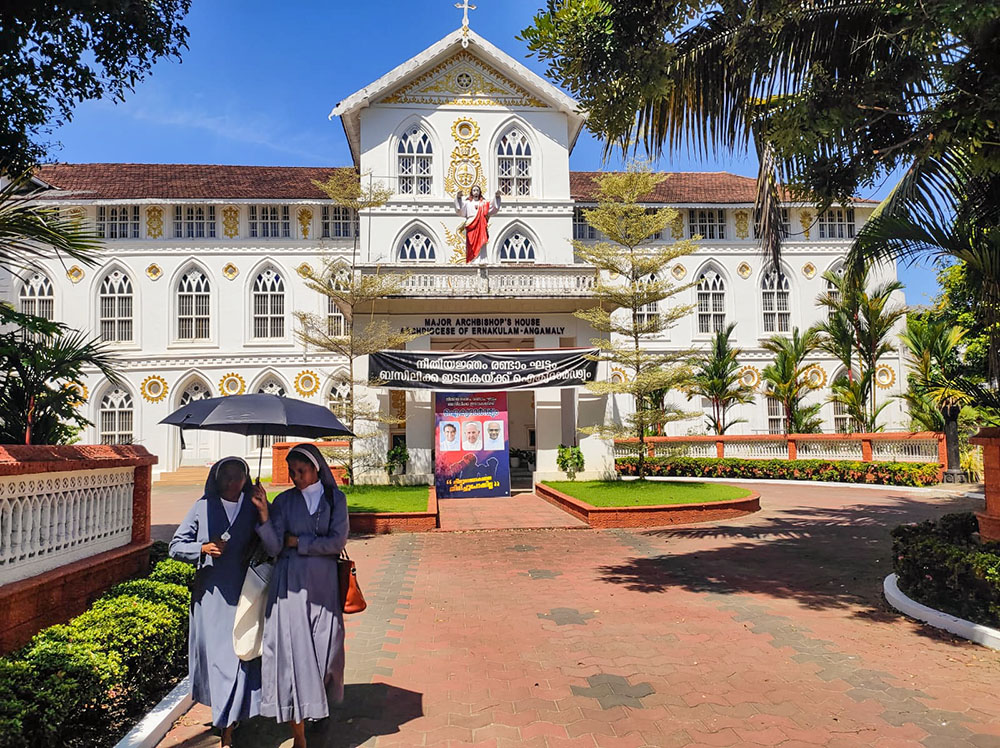
The archbishop's house in the Ernakulam-Angamaly Archdiocese in the southwestern Indian state of Kerala has witnessed protests, hunger strikes, and police activity for decades because of a liturgical dispute. (Thomas Scaria)
The peaceful settlement of the dispute brought joy to Apostolic Carmel Sr. Maria Nirmalini, the head of Conference of Religious India, which represents more than 130,000 men and women religious.
"We thank God for the gift of discernment and dialogue that prevailed in the liturgical crisis. May this unity help build deeper bonds of communion in a church that is invited to be synodal in nature," she told GSR.
She was happy the resolution went into effect on the feast of St. Thomas the Apostle, who is believed to have introduced Christianity to India in the first century. The Syro-Malabar Church is one of Kerala's Catholic communities and traces its faith to St.Thomas.
The fact that the Eucharist was offered in unity on the saint's feast day "was a testimony that humans are fragile, but the unconditional love of God the Father binds all his people," Nirmalini said.
Sister of Compassion Alphie Kidangen, a native of Ernakulam-Angamaly serving a mission station in Andhra Pradesh, another southern Indian state, said the missionary community in the country is excited over the resolution of the liturgical dispute.
"In mission stations, we never bother about whether the priest faces east or west. What we need is Eucharist," she said. She referred to the crisis over liturgy as a sign of power and prestige rather than peace and unity.
The June 19 meeting also decided to drop court cases against the dissident priests and replace the archdiocesan curia with new members.
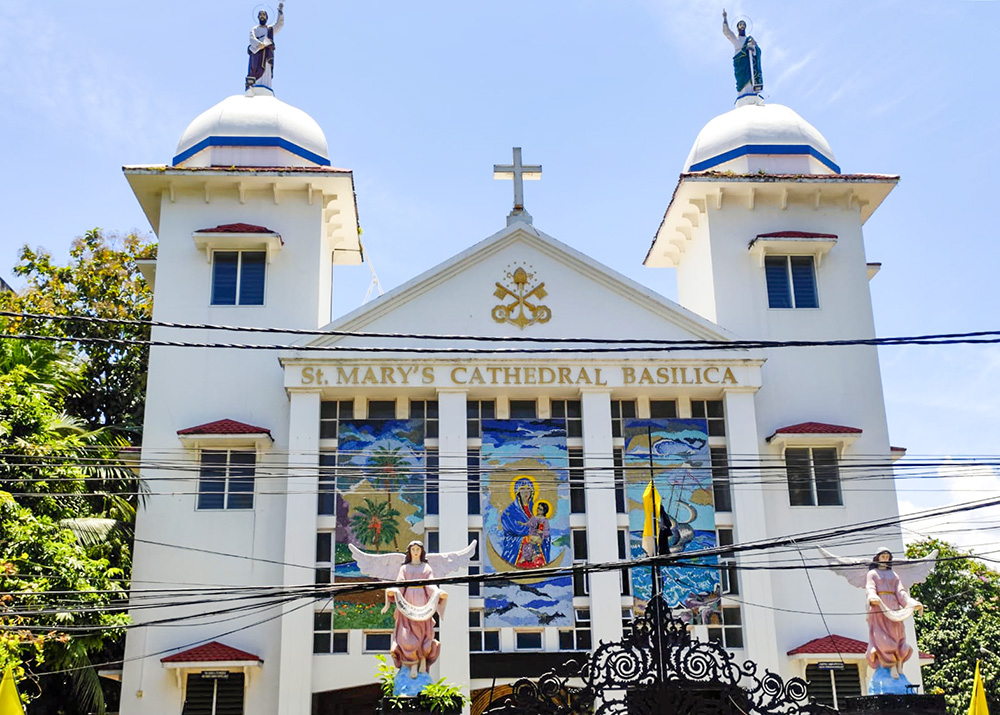
St. Mary's Cathedral Basilica remains closed because of the liturgical conflicts in the southwestern Indian Archdiocese of Ernakulam-Angamaly. (Thomas Scaria)
Achanparambil told GSR that Fr. Thomas Mangattu was appointed the parish priest of St. Mary's Cathedral Basilica, which remains closed. The priest who took charge on July 3 told GSR that the church will reopen only after the court settles several pending civil cases.
Achanparambil said she was praying that the cathedral would open soon and "heal the wounds of its people who were left without Mass for several years."
Mangattu praised nuns from various congregations for their continued support and dedicated services in the smooth functioning of the pastoral services in every parish in the archdiocese, including the cathedral.
"They have bridged the gaps in services and continued to teach catechism and other pastoral services in the parishes," he added.
Jose Vithayathil, a 75-year-old physician who attended Mass at St. Mary's Church, Alangad, on July 13, said most people are uncomfortable with the enforced Mass, but they have no other choice now.
"I feel really sad when the priest hides the consecration of the bread and wine from us by facing the altar, a practice we were never used to," the senior member of the parish told GSR.
Pauline Kodapparampakathu, a St. Mary's Church parishioner, said she disliked the altar-facing Mass, but was relieved the dispute was finally resolved.
A member of the Congregation of the Mother of Carmel, who sought anonymity, said she was also happy about the resolution. "Our priests and laity had fought for a solution for years, and they are at peace now," she told GSR.



